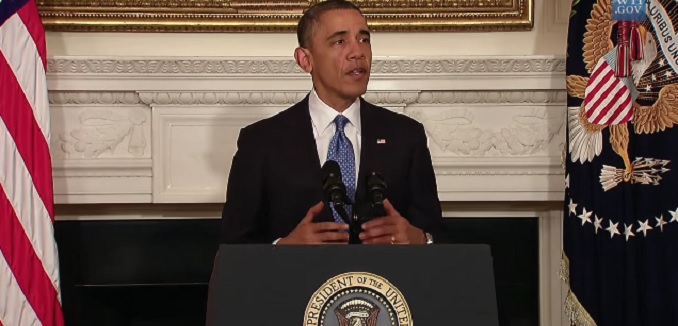President Barack Obama on Wednesday reemphasized what has in the last week become a central administration position on the unfolding Israel-Gaza crisis, insisting that the Israelis had a right to engage in self-defense and also noting that Jerusalem has made repeated efforts to deescalate the conflict:
Obama said the US supports Egypt’s continued efforts to restore the 2012 cease-fire. He said the US was working with its partners in the region to secure a cease-fire and would stay in close contact during the next 24 hours.
“There’s no country on Earth that can be expected to live under a daily barrage of rockets,” Obama said at the White House.
Obama more specifically remarked that “yesterday Israel did agree to a cease-fire. Unfortunately, Hamas continued to fire rockets at civilians, thereby prolonging the conflict,” gesturing toward a six-hour period during which Israel followed the terms of an Egyptian ceasefire and withheld fire, while Palestinian fighters in the Gaza Strip launched roughly 50 missiles at population centers inside the Jewish state.
Some of the rocket barrages over the course of the day were jointly claimed by Hamas and the Palestinian Islamic Jihad, with claims of responsibility suggesting that the two terror groups were cooperating.
Agence France-Presse (AFP) on Wednesday conveyed what the outlet characterized as the consensus of analysts, who converged on the assessment that Hamas’s rejection of the truce had ‘set the scene for a much broader operation in Gaza.’
The outlet cited a range of Israeli journalists and observers on the point:
“In the eyes of the world, Israel took a risk and gave a real chance to a ceasefire, while Hamas chose to continue fighting. This gave Israel renewed credit, including credit to expand the operation,” wrote Yoav Limor in pro-government freesheet Israel Hayom.
After six hours of calm, Prime Minister Benjamin Netanyahu ordered the military to resume its operations, saying Hamas’s rejection of the ceasefire had granted Israel the “international legitimacy” to expand and intensify its military operations.Shortly afterwards, he convened his security cabinet to discuss an operation against the network of tunnels used by militants to set up rocket launchers.
Ministers also discussed a limited ground incursion into the fringes of Gaza, which would not involve troops entering populated areas in the initial stage, army radio reported.
Commentators suggested there were three ways Israel could step up its campaign against militants in Gaza.
“There are three escalation scenarios — stepping up the air strikes; a limited ground operation at the margins of the Gaza Strip against the exits of the tunnels; and a broad ground operation at the end of which Israel will control Gaza for six months, two years or 20 years,” wrote Alon Pinkas in the top-selling Yediot Aharonot.
[Photo: The White House / YouTube]




